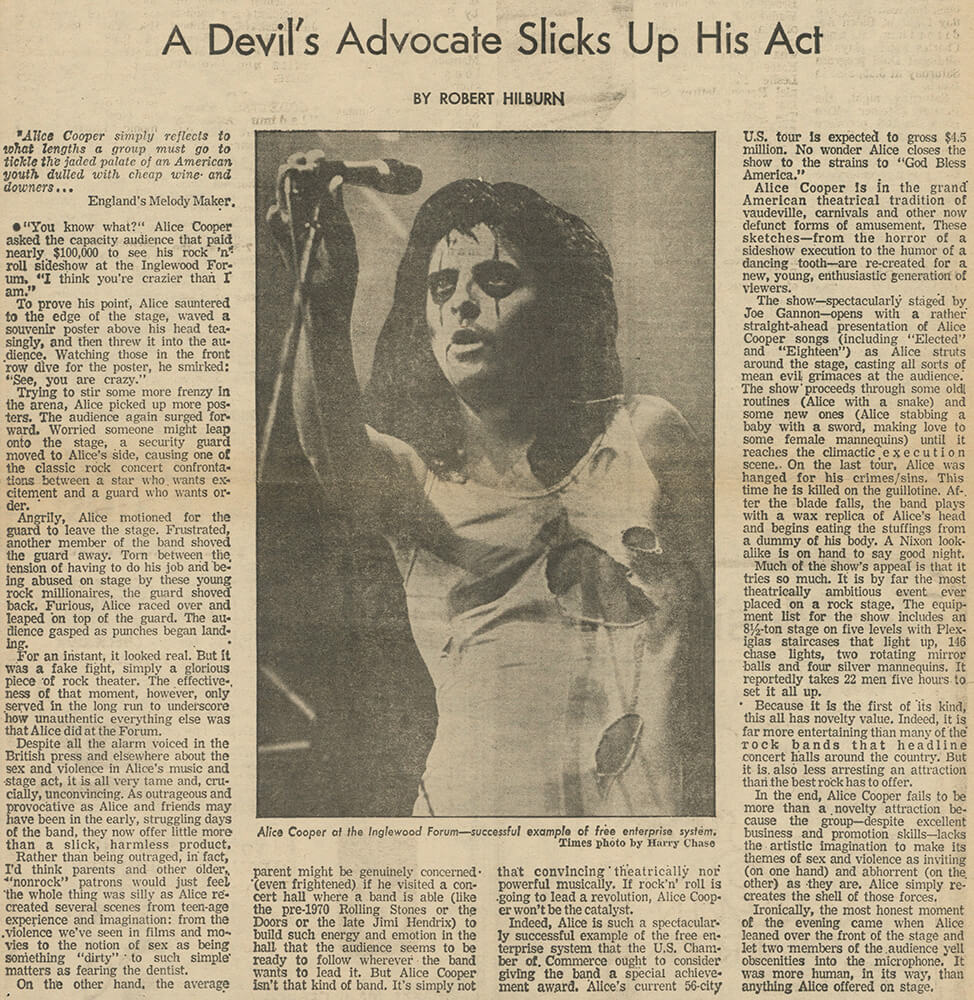Article Database
A Devil's Advocate Slicks Up His Act
"Alice Cooper simply reflects to what lengths a group must go to tickle the jaded palate of an American youth dulled with cheap wine and downers..." - England's Melody Maker.
"You know what?" Alice Cooper asked the capacity audience that paid nearly $100,000 to see his rock 'n' roll sideshow at the Inglewood Forum "I think you're crazier than I am."
To prove his point, Alice sauntered to the edge of the stage, waved a souvenir poster above his head teasingly, and then threw it into the audience. Watching those in the front row dive for the poster, he smirked: "See, you are crazy."
Trying to stir some more frenzy in the arena, Alice picked up more posters. The audience again surged forward. Worried someone might leap onto the stage; a security guard moved to Alice's side, causing one of the classic rock concert confrontations between a star who wants excitement and a guard who wants order.
Angrily, Alice motioned for the guard to leave the stage. Frustrated, another member of the band shoved the guard away. Torn between the tension of having to do his job and being abused on stage by these young rock millionaires, the guard shoved back. Furious, Alice raced over and leaped on top of the guard. The audience gasped as punches began landing.
For an instant, it looked real. But it was a fake fight, simply a glorious piece of rock theater. The effectiveness of that moment, however, only served in the long run to underscore how unauthentic everything else was that Alice did at the Forum.
Despite all the alarm voiced in the British press and elsewhere about the sex and violence in Alice's music and stage act, it is all very tame and, crucially, unconvincing. As outrageous and provocative as Alice and friends may have been in the early, struggling days of the band, they now offer little more than a slick, harmless product.
Rather than being outraged, in fact, I'd think parents and other older, "nonrock" patrons would just feel the whole thing was silly as Alice recreated several scenes from teenage experience and imagination: from the violence we've seen in films and movies to the notion of sex as being something "dirty" to such simple matters as the dentist.
On the other hand, the average parent might be genuinely concerned (even frightened) if he visited a concert hall where a band is able (like the pre-1970 Rolling Stones or the Doors or the late Jimi Hendrix) to build such energy and emotion in the hall that the audience seems to be ready to follow wherever the band wants to lead it. But Alice Cooper isn't that kind of band. It's simply not that convincing theatrically nor powerful musically. If rock'n' roll is going to lead a revolution, Alice Cooper won't be the catalyst.
Indeed, Alice is such a spectacularly successful example of the free enterprise system that the U.S. Chamber of Commerce ought to consider giving the band a special achievement award. Alice's current 56-city U.S. tour is expected to gross $4.5 million. No wonder Alice closes the show to the strains of "God Bless America."
Alice Cooper is in the grand American theatrical tradition of vaudeville, carnivals and other now defunct forms of amusement. These sketches — from the horror of a sideshow execution to the humor of a dancing tooth — are re-created for a new, young, enthusiastic generation of viewers.
The show — spectacularly staged by Joe Gannon — opens with a rather straight-ahead presentation of Alice Cooper songs (including "Elected" and "Eighteen") as Alice struts around the stage, casting all sorts of mean evil grimaces at the audience. The show proceeds through some old routines (Alice with a snake) and some new ones (Alice stabbing a baby with a sword, making love to some female mannequins) until it reaches the climactic execution scene. On the last tour, Alice was hanged for his crimes/sins. This time he is killed on the guillotine. After the blade falls, the band plays with a wax replica of Alice's head and begins eating the stuffings from a dummy of his body. A Nixon look alike is on hand to say good night.
Much of the show's appeal is that it tries so much. It is by far the most theatrically ambitious event ever placed on a rock stage. The equipment list for the show includes an 8 1/2-ton stage on five levels with Plexiglas staircases that light up, 146 chase lights, two rotating mirror balls and four silver mannequins. It reportedly takes 22 men five hours to set it all up.
Because it is the first of its kind, this all has novelty value. Indeed, it is far more entertaining than many of 'the' rock bands that headline concert halls around the country. But it is also less arresting an attraction than the best rock has to offer.
In the end, Alice Cooper fails to be more than a novelty attraction because the group — despite excellent business and promotion skills — lacks the artistic imagination to make its themes of sex and violence as inviting (on one hand) and abhorrent (on the other) as they are. Alice simply re-creates the shell of those forces.
Ironically, the most honest moment of the evening came when Alice leaned over the front of the stage and let two members of the audience yell obscenities into the microphone. It was more human, in its way, than anything Alice offered on stage.




